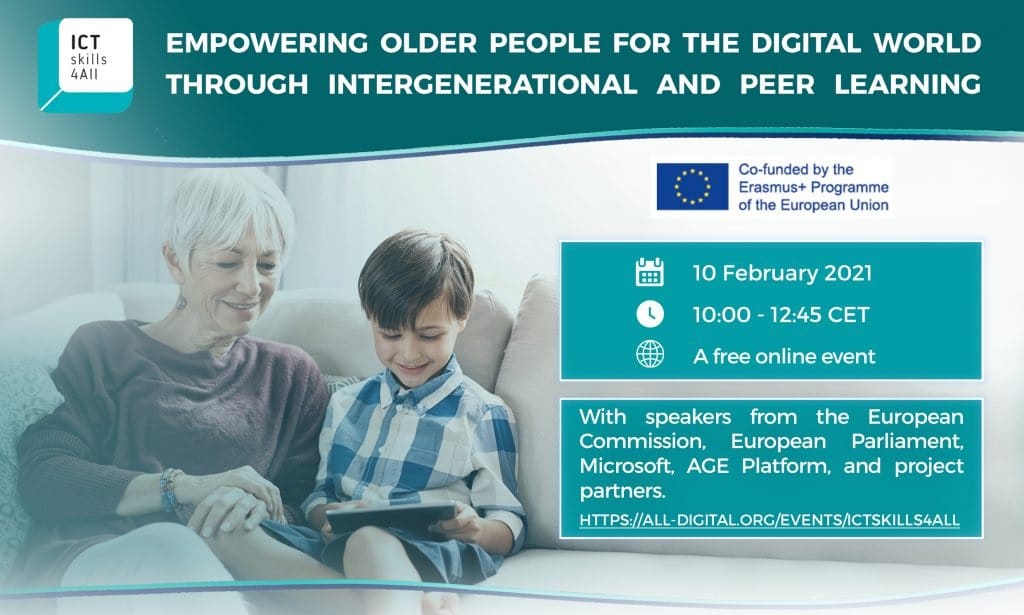AGE participated in the final conference of the ICTSkills4All project, an Erasmus+ project focussed on developing digital skills of older people. During the event, we discussed with the Vice-Chair of the Culture and Education Committee of the European Parliament, a representative of the Commission’s unit working on eHealth and Ageing and a representative from Microsoft.
Digital skills are a narrow concept and should be expanded to media literacy and accessibility
Our colleague Philippe Seidel explained why it is sometimes misleading to speak about lack of digital skills: many older persons learned how to use command lines in the past, but these skills are no longer relevant. Although many opportunities exist to use technologies for health and to improve communication, the lack of digital inclusion of older persons is hindering their deployment, noted both our policy officer and the Commission’s representative.
By ‘digital inclusion’, Philippe meant a host of factors: skills are important, but connectivity and financial accessibility are just as important. Furthermore, the accessibility of online tools for persons with disabilities is not a given, in a context where many vital day-to-day services are moving online. Another important element is trust in digital technologies: abusive practices such as phishing are more and more sophisticated, the multiplication of platforms and websites means it is more difficult to know what to trust.
“Digital skills initiatives must increase overall media literacy, not just the technical skills. They should encourage creativity and content-creation and take into account what animates learners, and especially older learners: they want to have fun, be valued for their learning and socialise” added Philippe Seidel
We furthermore underlined that while the problems linked to digital literacy of older persons have very well been sketched out in the Commission’s Digital Education Action Plan (to which AGE provided a contribution), there are almost no concrete actions proposed for older persons. Non formal learning settings are only briefly mentioned and initiatives focus on formal, initial education. The EU could support such initiatives much more via the use of funds, exchange of good practices and awareness-raising with the national managing authorities of EU funds and potential project promoters. Some good examples, such as Digitol, MobileAge or the just-started FAITh project, exist, but need to be upscaled. To be successful, projects need to build on peer learning, focus on the individual needs of older learners, be fun and social.
Commission, MEP and Microsoft: design online services with older persons, create a specific strategy and increase trust
From the side of the European Commission, Ms Irina Kalderon Libal underlined the importance of population ageing and the challenges and opportunities of technologies in health and long-term care settings, and beyond in enabling active and healthy ageing. To be effective, projects, products and services must be designed with older people rather than only for them, pointed out the Commission’s representative, who also underlined the momentum created by the Council conclusions on human rights of older persons in an era of digitalisation. Member of the European Parliament Mr Victor Negrescu stressed how important it is to think about a specific EU action plan on digital skills for older persons. The EU has the chance now to build coherent policies on ageing in all relevant policy areas, and it should seize this opportunity. The representative of Microsoft, Mr Quang-Minh Lepescheux presented a successful project from Singapore setting up virtual clinics, where older people can pass by and ask younger expert about the digital world. He also stressed that security is an important area where technology companies can do more, but ultimately this will not be effective without increasing media literacy.
The Erasmus+ project ICTSkills4All, coordinated by the University of Porto, has mapped online resources to improve digital skills in older adults. The project has also developed materials to make digital platforms easier to use and built digital education programmes for older persons using peer-to-peer and intergenerational approaches.
For more information, you can contact Philippe Seidel, philippe.seidel@age-platform.eu
Useful links:
- AGE Platform’s contribution on the Digital Education Action Plan
- AGE projects on digitalisation and older persons
FAITh; DIGITOL; MobileAge; - AGE reaction to the Council conclusions on human rights of older persons in an era of digitalisation
- ICTSkills4all project website
- ICT for ageing well: Listen to what older persons think!







